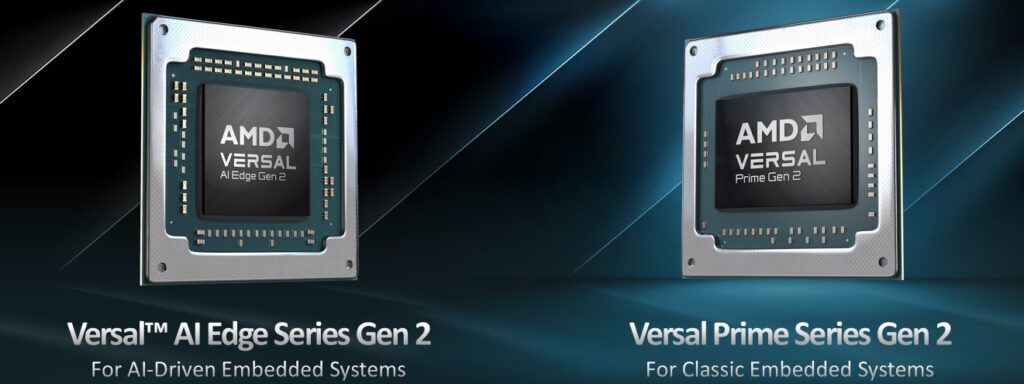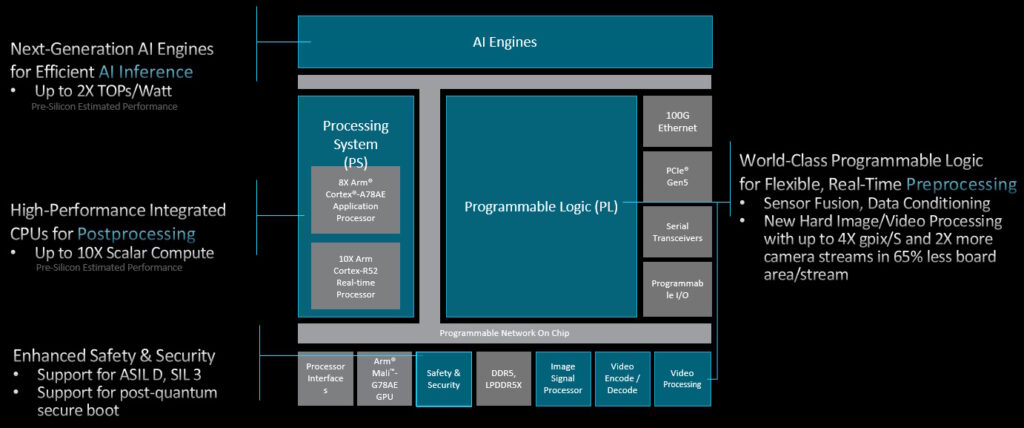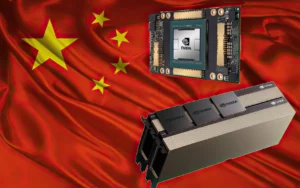
Introduction
In a groundbreaking collaboration, AMD has joined forces with Arm to introduce a pioneering AI chip family, the Versal Series Gen 2. This innovative technology promises to revolutionize the AI landscape by combining preprocessing, inference, and postprocessing tasks on a single silicon platform.
Follow us on Linkedin for everything around Semiconductors & AI
A New Era for AI
Traditionally, AI processes have been scattered across multiple chips, leading to inefficiencies and limitations. Here’s why:
Chip Specialization: Specific tasks excel on different chips. CPUs shine in general processing, whereas GPUs specialize in processing vast amounts of data in parallel, making them ideal for certain AI computations.
Limited Chip Capabilities: In the past, individual chips may not have been powerful enough to handle all the complexities of AI processing, especially for large models. This led to splitting the workload between multiple chips.
Design Challenges: Creating a single chip that can efficiently handle all aspects of AI processing is very complex. It requires balancing different functionalities like processing power, memory bandwidth, and specialized AI accelerators on a single piece of silicon.
The Versal AI Edge Series Gen 2 SoCs (System-on-Chips) tackle this head-on by offering a unified solution.
A System-on-Chip (SoC) is essentially a tiny powerhouse that integrates all the critical components of an electronic system onto a single chip. It is like a miniaturized circuit board where everything needed for a specific function is packed together.
This innovative technology integrates preprocessing, inference, and postprocessing tasks onto a single silicon platform, streamlining AI-powered embedded systems.
Read More: ABCI-Q: Nvidia Joins Forces with Japan to Build First Hybrid Supercomputer – techovedas
Performance Boost for Embedded AI
The Versal AI Edge Series Gen 2 boasts a powerful combination of high-performance Arm CPUs and next-generation AI engines.
AMD claims up to 10x more scalar compute compared to the first generation Versal AI Edge Series.
The industry expects the next-generation AI engines to achieve up to 3 times higher TOPs-per-watt (tera operations per second per watt) compared to the first generation. TOPs, a metric used to measure AI processor performance, indicates greater efficiency in processing AI tasks when TOPs-per-watt is higher.
Along with inclusion of up to 8X Arm Cortex-A78AE Application Processors (APs), up to 10X Arm Cortex R52 Real-Time Processors (RUs), and up to 144 AI Engine-ML V2 tiles. These tiles come with up to 72 Mb of data memory and up to 288 Mb of shared memory. Additionally, the control logic for the AI Engines has been strengthened and integrated into the AI block itself, rather than relying on the programmable fabric as before. As for the Programmable Logic (PL), it incorporates up to 1,188,040 System Logic Cells (SLCs), with up to 543,104 Look-Up Tables (LUTs), up to 2,064 Digital Signal Processing (DSP) engines, up to 16.6 Mb of Distributed RAM, up to 47.2 Mb of Block RAM, and up to 33.2 Mb of UltraRAM.

A Boon for Diverse Industries
The impact of the Versal Series Gen 2 extends far beyond just the chip itself. These SoCs have the potential to revolutionize a vast array of industries.
- Faster Decision-Making in Autonomous Vehicles: Traditional AI systems in autonomous vehicles might struggle with real-time data processing. This leads to delays in critical situations. The Versal SoCs’ improved processing power and efficiency can enable faster object detection, path planning, and reaction times
- Smarter Factories: Integrating AI into factory processes can optimize production lines and enable predictive maintenance.
- Advanced Medical Imaging: AI analysis of medical scans can lead to earlier and more accurate diagnoses. The Versal SoCs can be integrated into medical imaging devices like MRI machines. This enables faster and more powerful on-device analysis, potentially leading to improved patient outcomes.
Read More: 8 Open-Source Initiatives to Design & Fabricate Your Chip – techovedas
Conclusion
The collaboration between AMD and Arm marks a significant leap forward in Gen 2 AI chip technology. The Versal Series Gen 2 SoCs embody the future of AI-driven systems, offering a glimpse into a world where AI is more integrated, efficient, and accessible. As we eagerly await the release of these products, the potential for transformative changes in our digital lives is undeniable.



